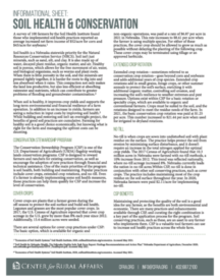Para la versión en español, por favor oprima aqui.
A survey of 100 farmers by the Soil Health Institute found those who implemented soil health practices reported an average increased net farm income of $52/acre for corn and $45/acre for soybeans.
Soil health is a Nebraska statewide priority for the Natural Resources Conservation Service (NRCS). Soil isn’t just minerals, such as sand, silt, and clay. It is also made up of water, decayed plant residue, organic matter, and air. Healthy soil is porous, which allows for the free movement of air, water, and biological organisms, such as worms and plant roots. When there is little porosity in the soil, and the minerals are pressed tightly together, it is harder for roots to dig into and less absorbent when it rains. This compaction not only makes the land less productive, but also less efficient at absorbing rainwater and nutrients, which can contribute to greater problems of flooding and groundwater contamination.
When soil is healthy, it improves crop yields and supports the long-term environmental and financial resilience of a farm operation. In addition to an increase in yields, farmers are seeing a reduction in input costs by improving soil health.3 While building and restoring soil isn’t an overnight project, the benefits of good soil practices are cumulative. Farming for healthy soil is a good choice economically, but knowing what is right for the farm and managing the upfront costs can be daunting.


